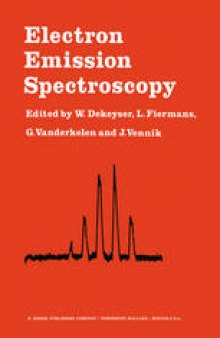 جزییات کتاب
جزییات کتاب
Electron emission spectroscopy became recently a major tool for the study of molecules and solids. These volumes contain a rather complete review of the state of the art in this field. Both the physical and chemical aspects are covered extensively by well known specialists. Different modes of excitation are used in electron emission spec troscopy. The electron-solid scattering is covered in detail by C. B. Duke, from a theoretical point of view. Elastic and inelastic low energy electron diffraction are extensively discussed in relation to the geometrical, electronic and vibronic structure of solid surfaces. Auger electron emission spectroscopy (AES) is covered by J. C. Tracy. The tech nique is discussed from the point of view of surface research. This part also contains a complete literature list concerning the application of AES up to the middle of 1972. Electron emission produced by X-ray impact, is covered by C. S. Fadley, D. T. Clark, R. P. Gupta and S. K. Sen. The contribution by C. S. Fadley, entitled Theoretical Aspects of X-Ray Photo electron Spectroscopy', is an up to date discussion of core electron binding energies, valence electron binding energies, multiplet splittings and multi-electron processes. R. P. Gupta and S. K. Sen's contribution provides an introduction to crystal field theory and its application to electron energy level determination. D. T. Clark deals with the more chemical aspects of X-ray photoelectron spectroscopy, i.e. the study of chemical shifts and the relation to the bonding characteristics in molecules.



 دانلود کتاب
دانلود کتاب

 جزییات کتاب
جزییات کتاب





 این کتاب رو مطالعه کردید؟ نظر شما چیست؟
این کتاب رو مطالعه کردید؟ نظر شما چیست؟
